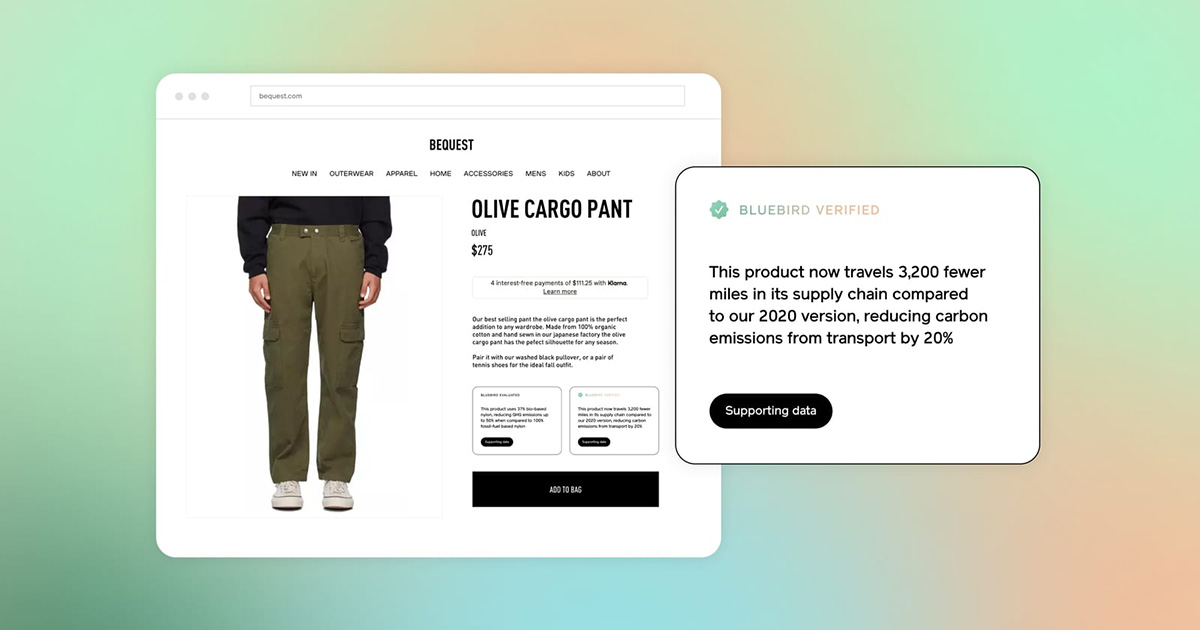Tell Your Sustainability Story with Bluebird Climate
The Origin Story of Sustainable Startup Bluebird Climate

Last Updated: By TRUiC Team
More and more consumers are looking to buy more sustainable products. However, actually making a sustainable product, or improving the sustainability of ones you already make, is much easier said than done.
Greentech firm Bluebird Climate helps companies do just that. The startup has developed a software as a service (SaaS) platform that makes it relatively easy for a business to measure and improve the sustainability of its products – and, just as importantly, communicate those sustainability gains to customers. The platform encompasses a product’s entire lifecycle, including materials, transportation, packaging, and manufacturing. Here is Bluebird Climate’s origin story.
Sustainability — a Worthy, but Difficult, Goal
Bluebird Climate CEO Jamie McCroskery is a former project manager. While working at Glossier, he helped lead their technology department, including experimenting with different sorts of community projects the company could build. “That's where I saw the sustainability problem firsthand,” he says. “Their employees, they're all millennials who care about sustainability. Customers really care about it. Investors care about it.”
The problem, he discovered, is that “no one really knew how to introduce sustainable products in a way that wasn't going to blow up the business and also communicate that to customers. It seemed like an opportunity to actually help make a difference.”
McCroskery notes that the beauty, apparel, and food and beverage industries have some of the most carbon-emitting supply chains. However, this isn’t an easy problem to fix. “We saw an opportunity to help, to use software to make it easier to produce low carbon products and then market that to their customers, which is what we do at Bluebird.”
Development of Startup
Bluebird Climate’s overall goal is to help companies make better sustainability decisions during product development without having to hire someone in-house for that job. They also can help “transparently and authentically communicate that work to your customer so that they're brought along with the journey following decisions you made,” McCroskery says.
He notes that most of a company’s sustainability improvements come from actually producing products, as opposed to operating an office or having employees drive to work (although these obviously affect sustainability as well). “[About] 95% carbon emissions come from the products and their supply chains, and that stuff is really hard to get a grasp on.”
To help with this, clients can upload data about their products and supply chains to Bluebird Climate’s platform. Then, using machine learning, Bluebird Climate allows them to make an “apples to apples” sustainability comparison across different product concepts. For example, a company that makes five different types of jeans with different cuts, fabric weights, etc., can see carbon emission estimates before the jeans are produced. This helps both designers and marketers; the latter can trumpet the client’s sustainability practices to customers, like the fact that one of the client’s products travels 50% fewer miles than the average product in the category.
“Sustainability and supply chain are super complicated, and we're able to make it really easy,” McCroskery says. “[We’re] making software that brands actually want to use, not like something really, really complicated and archaic.” All the client has to do is obtain certain sustainability data from their vendors, and Bluebird Climate’s algorithms do the rest. “There is a lot of data because that's what sustainability is: it's carbon emissions and the waste calculations. [We] wrap that into something that's really useful for the brand so they can communicate to their customers and make better decisions.”
Public Benefit Corporation, Lessons Learned
McCroskery says the co-founders of Bluebird Climate chose to make it a public benefit corporation, which is a type of C corp in which the company has “legal charter guardrails” that ensure it focuses on some defined impact in addition to profits. “That was really, really important for us upfront because we are a mission-oriented business. We're in the business of decarbonizing the consumer products industry. And so we know if we bring on investors and other stakeholders, we essentially want those guardrails to be in place.”
Reporting for a public benefit corporation is similar to that of a regular C corp, except it includes annual impact reporting. This also helps “signal to investors and customers that … you're not green-washing,” he says. “You're essentially putting some real stake in the ground that you care about this stuff.”
If he were starting over, McCroskery says he would pursue outside funding more vigorously. “For a long time, I really resisted the pull of outside funding,” he says. Although he initially “didn’t want to have a boss” or “be beholden to whatever outside force,” his attitude eventually changed. “I think that was a bit of a naive perspective because I was essentially slogging away trying to build deals with zero resources. It was really, really hard. And the trade-off essentially is time and resources.” With outside funding, he discovered, “You can go way faster and therefore have a higher likelihood of surviving.”
Pilot Program Expansion
According to a New York University study, McCroskery says, sustainably marketed goods are growing 7.1 times faster than and command a large price premium over conventionally marketed goods. That bodes well for Bluebird Climate’s business model.
Today, the company operates a pilot program that essentially provides information about how clients can work with existing vendors and other business partners to increase sustainability. “I think a year from now, it's going to look way different. We'll have more brands. We'll have way more space,” he says. “But by design, we're keeping it small now so that we are really sure that we're doing the right thing.”
As the company grows, McCroskery wants to simplify and automate a lot of the changes that clients can make to increase sustainability. “If we know what products these brands are producing, if we know who all the vendors are and how to organize transportation and do everything in a low-carbon way, it should be as simple as pressing a button. That's the vision, but for right now, we're essentially just advising because we know these companies just need help.”
Next Steps:
- Check out Bluebird Climate’s company profile and their insights for aspiring entrepreneurs!
- Keep up with more startup companies by following Startup Savant on Google News!
- Start your own startup by reading our How to Start a Startup guide.
Tell Us Your Startup Story
Are you a startup founder and want to share your entrepreneurial journey with our readers? Click below to contact us today!


